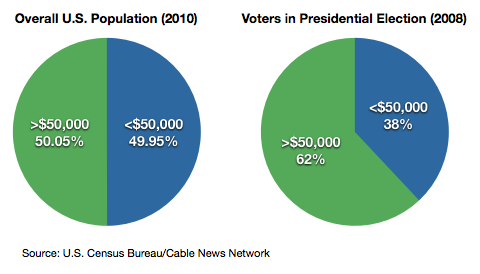Last December, 57 percent of Americans said that the wealthy do not pay their fair share of taxes. Yet the Buffet Rule, which would ensure that everyone does pay their fair share, was dead on arrival in Congress.
It doesn't end there. Over the past fifty years, for example, the average tax rate on the top .01 percent of taxpayers was cut in half, while the bottom 90 percent saw no change in their rate; In that same period, incomes on the top .01 percent quintupled, while those on the middle class remained stagnant.
John Adams said in 1776 that government should be "In miniature an exact portrait of the people at large." That principle -- equal representation -- has been the foundation of American democracy for over two centuries. Why, then, has our government adopted policies so out-of-sync with the public's interests?
Unsurprisingly, our government does not, in fact, represent us all. Instead, it represents a small, elite group of Americans -- namely, the affluent.

Behold, American "democracy." In 2008, nearly two-thirds of the electorate had a household income above $50,000 a year, but that portion fell to a half when looking at the country at large.
It no longer appears surprising that our culture is so cozy for the wealthy. The affluent show up at the polls and vote for the politicians that will best protect their wealth and interests. The less well-off, on the other hand, may have trouble getting out to vote, and are left with no one to fight for them.
Historically, only about half of the nation casts a vote for president every four years, and just below two in five vote in midterm Congressional races. That reality makes equal representation a far-fetched goal: How can everyone be represented when only half of us vote?
This trend is further deepened by the ongoing efforts in Republican-controlled states to starve voter turnout. Laws requiring voter identification and cutting down on early voting will turn nearly five million voters away from the polls in the 2012 elections, according to the Brennan Center for Justice. Worse yet, these burdens will "fall most heavily on young, minority and low-income voters, as well as on voters with disabilities."
If equal representation is ever something we wish to achieve, we better start brainstorming. We require Americans to serve on juries, grounded in our belief that the law should not be determined by a select few. Why should voting be any different? A just, democratic nation cannot only represent half its population. We need to require every American to cast a vote, or at least encourage it.
Adams argued that government should "think, feel, reason and act" like the people they serve. And only equal representation can "prevent unfair, partial and corrupt elections." It was one of our own leaders, John McCain, who stamped the recent Iranian elections as a "sham, corrupt election." Well, if we turned back the clock a few hundred years, our founders would likely say the same about us.
